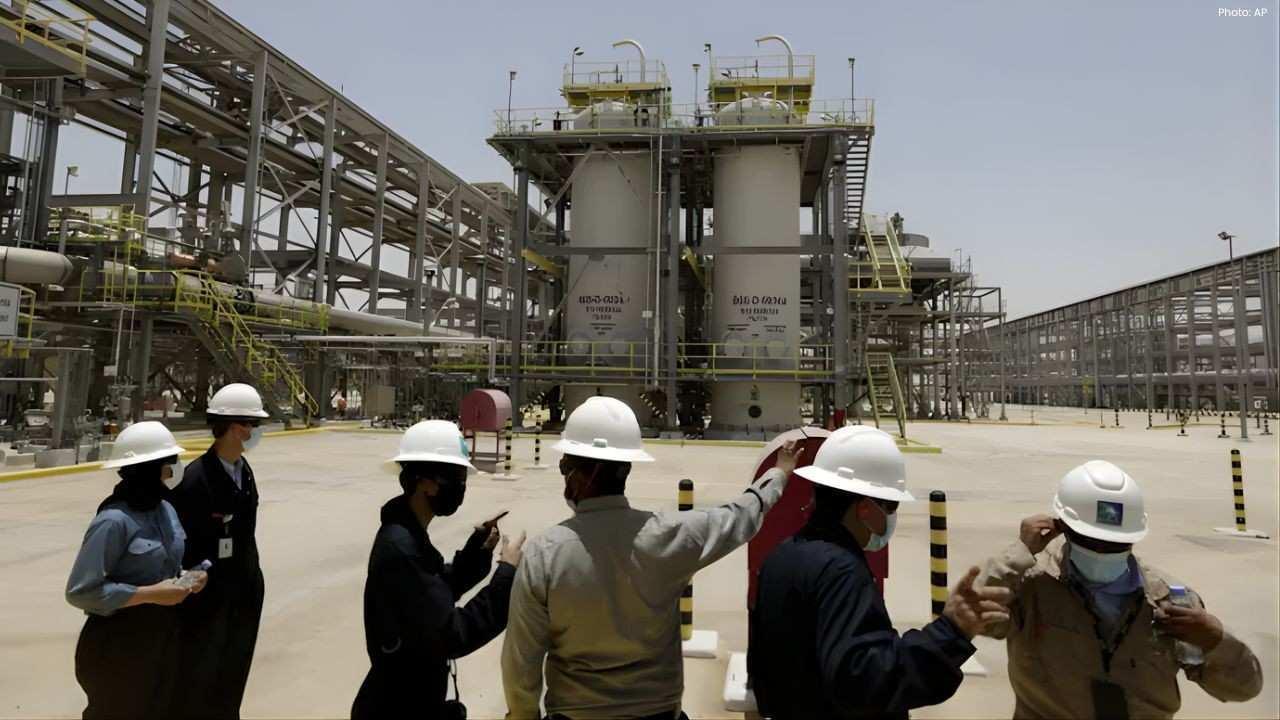
Post by : Mariam Al-Faris
The price of Kuwaiti oil increased on Monday, reaching US$71.33 per barrel. This is a small rise of nine cents compared to last Friday’s price of US$71.24 per barrel, according to the Kuwait Petroleum Corporation (KPC).
This increase highlights the ongoing fluctuations in the oil market, which can change daily depending on supply, demand, and global economic conditions. Even a small rise like this is closely watched by investors, governments, and industries because it can impact fuel prices, trade balances, and national revenues.
Global Oil Market Trends
Oil prices around the world also saw an upward movement. Brent Crude, one of the major global oil benchmarks, rose by $1.07, reaching $68.80 per barrel. Meanwhile, West Texas Intermediate (WTI), a key oil benchmark in the United States, increased by $1.14, reaching $64.80 per barrel.
These rises in global oil prices reflect several factors, including market expectations, geopolitical events, production levels, and economic activity. Higher oil prices can affect not only energy companies but also transportation, manufacturing, and consumer prices globally.
Factors Behind the Price Rise
Several reasons may have contributed to the increase in oil prices. First, global demand for oil continues to grow as economies recover and energy use increases. Countries with growing industrial activity often need more fuel, pushing prices higher.
Second, production adjustments by major oil-producing countries can affect prices. If producers limit supply to maintain balance or protect their revenues, the market experiences tighter supply, which can increase prices.
Third, geopolitical tensions or disruptions in oil-producing regions can create uncertainty. Traders often respond to these situations by adjusting prices upward to account for potential shortages.
Impact on Kuwait’s Economy
Kuwait, as a major oil-producing country, closely monitors oil prices because they are a vital part of the national economy. Rising oil prices increase the revenue earned from oil exports, which can help the government fund development projects, public services, and infrastructure.
Even a small increase, like nine cents, is significant when multiplied by the millions of barrels Kuwait exports each day. Higher oil revenues strengthen the country’s budget and can support economic stability.
Effects on Global Energy Markets
The increase in Brent and WTI prices also impacts the global energy market. Countries that import oil may face higher costs for fuel and energy products, while oil-exporting countries benefit from increased income.
Industries dependent on energy, such as transportation, manufacturing, and chemicals, may experience changes in operational costs. Consumers may notice higher fuel prices at gas stations, which can influence the cost of goods and services.
Short-Term vs Long-Term Trends
Experts emphasize the difference between short-term price movements and long-term trends. While daily or weekly price changes are normal, long-term trends depend on broader factors like global economic growth, energy transition policies, renewable energy adoption, and technological advancements in oil extraction.
Tracking these trends helps investors and policymakers make informed decisions. A short-term increase of a few cents is part of the daily fluctuations, but persistent rises or falls over months can have larger economic implications.
Role of Kuwait Petroleum Corporation
The Kuwait Petroleum Corporation (KPC) is responsible for monitoring, reporting, and managing Kuwait’s oil production and pricing. KPC ensures that prices reflect both global market conditions and the country’s strategic economic interests.
By providing accurate price updates, KPC helps investors, traders, and businesses plan their operations and investments. Transparency in reporting also supports Kuwait’s position in the international energy market.
Global Oil Benchmarks
Brent Crude and West Texas Intermediate (WTI) are two key benchmarks for global oil pricing. Brent Crude, primarily produced in the North Sea, serves as a reference for oil sold in Europe, Africa, and parts of Asia. WTI, produced in the United States, is a key reference for American oil markets.
Movements in these benchmarks often influence regional oil prices, including Kuwaiti oil. Investors and governments track Brent and WTI prices closely to anticipate market shifts and make economic decisions.
Influence of Supply and Demand
Supply and demand are central to understanding oil prices. When demand exceeds supply, prices tend to rise. Conversely, when supply is abundant and demand is low, prices fall.
Global events, such as economic growth, industrial activity, weather disruptions, or political issues, can quickly alter the balance. The recent increase in Kuwait oil price and global benchmarks reflects current market dynamics where demand is steady or rising and supply is carefully managed.
Importance for Businesses and Consumers
Rising oil prices affect many sectors. For energy companies, higher prices can mean increased profits and expansion opportunities. For transportation and manufacturing companies, costs may rise, which can impact pricing strategies and profitability.
Consumers also feel the effect of oil price changes through higher fuel prices, which can affect travel, transportation costs, and the overall cost of goods. Governments often monitor oil prices to manage subsidies, taxation, and energy policies to protect consumers and maintain economic stability.
Analysts expect oil prices to continue fluctuating in response to global events, production adjustments, and market expectations. While the rise to $71.33 per barrel is modest, it is part of ongoing trends that traders, businesses, and governments follow closely.
Kuwait, as a major oil exporter, benefits from careful management of production and pricing to maximize revenue and ensure stability. Global energy markets remain interconnected, meaning local price changes can have international effects.
Understanding Oil Price Movements
The recent increase in Kuwait oil prices is a reminder of how closely energy markets are linked to global economic activity, production policies, and international benchmarks. Rising prices benefit exporting countries like Kuwait, while importing countries and consumers may face higher costs.
By monitoring daily and long-term trends, businesses, policymakers, and consumers can better navigate the impacts of oil price changes. Kuwait’s careful management of its oil sector, along with updates from KPC, ensures that both national and global stakeholders are informed and prepared for market shifts.










South Africa Recover Against Pakistan in Rawalpindi Test
South Africa fight back after early wickets, trailing Pakistan by 247 runs as Stubbs and De Zorzi st

Shaheen Afridi Named Pakistan ODI Captain, Replacing Rizwan
Pakistan Cricket Board names Shaheen Shah Afridi as new ODI captain, replacing Muhammad Rizwan ahead

PSG Held to 3-3 Draw by Strasbourg in Thrilling Ligue 1 Clash
PSG and Strasbourg played a thrilling 3-3 draw in Ligue 1. Senny Mayulu’s late goal helped PSG stay

South Africa Crush Sri Lanka to Record Sixth 10-Wicket Win
Laura Wolvaardt and Tazmin Brits scored half-centuries as South Africa easily chased 121 to beat Sri

Kohli and Rohit Return for India vs Australia ODI Series
Virat Kohli and Rohit Sharma return for India’s ODI series against Australia. Aaron Finch supports t

UN Women Calls for Safe Aid and Recovery for Gaza Women
UN Women urges placing women and girls at the center of Gaza aid, recovery, and reconstruction durin